Photos by Ebet Roberts
With a considerable influx of new attendees arriving on Thursday, the mood at Folk Alliance became a bit more determined, even as the ease of getting things done became a scootch more difficult. Hallways crowded with cases of all shapes sizes, from Accordion to Zither.
Richard Thompson’s interview, like Thompson himself, was off-center, funny and far-ranging. On how he has been able to make successful shifts from one genre to another, Thomson gave musicians an interesting perspective: “When you bring an instrument into a tradition, you bend it. You make it sound more like a human voice,” he advised, and, of course the human voice is the one instrument found in all musical traditions, from the beginning of time.
Tom Chapin, another longstanding hero from a different tradition, entertained with his signature mix of humor and social relevance, including “Fair Pay, Fair Play Blues,” about the difficulties digital music and the concept of “free music” has brought to musicians everywhere, with lines like “We’re all watching You Tube pull a high-tech robbery.”
Dan Navarro, who runs one of the more interesting rooms at Folk Alliance, had a big-room event of his own, where his rich vocals—with just enough roughness to convey reality—offered up a few of his evocative songs like “Your Bulletproof Heart.”
Outside of Elmore’s usual Americana range, we were captivated by the young Mexican artists in the band Villalobos. Fabulously energetic, the six young guys wielded bass, drums, guitar and three fiddles to create exuberant controlled chaos. The bassist looks twelve, the three fiddlers lined up to play their instruments behind their backs, and I didn’t understand a word they sang, but understood the music perfectly.
Chris “Bad News” Barnes and his about-to-pop pregnant wife played tunes they’d recorded with TV-band royalty (Jimmy Vivino, Will Lee, Shawn Pelton, etc.) and were here backed by a local Kansas City band which stepped up for the occasion. Barnes generously had the local guys perform multiple solos, and finished off the set with an amazing, bluesy, shouter-of-a-version of the Allman Brothers’ “Whippin’ Post.”
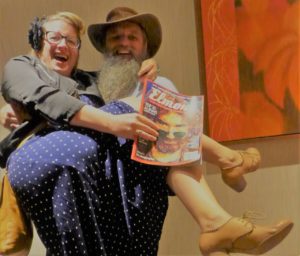
We first head Australia’s Hat Fitz & Cara at Rhythm & Roots Festival a couple of years ago, and have been waiting for their US return ever since. The set started with Cara walking through the audience playing her pennywhistle (or maybe a fife), then the two joined forces, with Hat Fitz on resonator and Cara on drums and whistles. Hat Fitz’s gravel voice is the perfect foil for Cara’s lovely vocals—lovely like a beautiful horse, not like a delicate hummingbird. “Eliza Blue,” a droning Frank McNamara classic and “Wily Ways,” one of Cara’s originals, were among the highlights.
Hot on the heels of his new album and autobiography, John Oates took to one of the larger stages with full backup, the Good Road Band. He began by announcing they were going to start off the set with “a pop favorite [pregnant pause]…from 1924.” That Emmett “minstrel man” Miller tune, “Anytime,” set the tone for an entertaining recap of Oates’ album Arkansas, his homage to his roots. The full band wailed on “Stack O Lee,” a crowd favorite, and one which Elmore premiered.
The Kingston Trio, comprised of actual and honorary descendants of the original group, played a much-appreciated midnight show, classic songs introduced with by family memories and context. Josh Reynolds (son of Nick Reynolds), Mike Marvin (Nick’s nephew) and Tim Gorelangton, the group’s musical director and and old Reynolds’ family friend. Marvin offered moving historical context before singing one of the KT’s signature songs, Pete Seeger’s “Where Have All the Flowers Gone?” I had no idea that Seeger had been an aircraft mechanic in WWII, where his service in the Army strengthened his commitment to peace.
The most interesting music of the night came from Sam Reider and the Human Hands. Reider, who’s a classically-trained jazz musician who played with eclectic-musician-emeritus David Amram, has put together a disparate group which is making music that certainly defies description by this writer. Violin, standup bass, mandolin, guitar, and Reider’s own accordion come together like a fjord and the sea. The music moves seamlessly from dissonance to delicate solos to symphonic convergence and back again. I doubt the audience had come prepared for an accordion-guitar duel, but I guarantee they left hoping to see another, sometime soon. Me too.
—Suzanne Cadgène


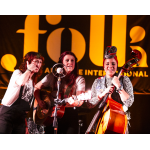
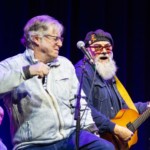
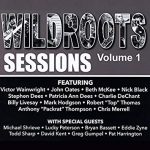
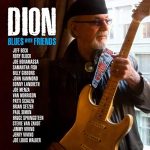

Be the first to comment!